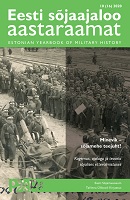Millist minevikku sõdur vajab? Sõjaajalugu, ajalooharidus ja demokraatlik eetika tänapäeva Saksamaal
Which Past for the Soldier? Military History, Historical Education, and the Ethics of Democracy in Germany Today
Author(s): Jörg EchternkampContributor(s): Toomas Hiio (Translator)
Subject(s): Cultural history, Ethics / Practical Philosophy, Military history, Political history, Social history, Sociology of Education
Published by: Tallinna Ülikooli Kirjastus
Keywords: military traditions; Historical Education; Military History; Democracy in Germany Today;
Summary/Abstract: The creation of military traditions depends on the meaning attributed to certain aspects of the past based on the needs of the present. The history of tradition creation in West Germany since 1955 is one example. After the end of the era of National Socialism, the Bundeswehr, the armed forces of the new democratic state, was expected to distinguish itself from the Wehrmacht and emphasize the role of soldiers as citizens. Knowledge of history was made part of democratic education and was no longer a model of military achievement. The center of military history, the museum of military history and traveling exhibitions, as well as special magazines of military history, contributed to the understanding of what is valuable in the past tradition. This included in particular the Prussian reforms of the early 19th century, the assassination of Hitler on July 20, 1944, and the history of the Bundeswehr itself. Knowledge of military history, it is argued, helps soldiers in battle better grasp the ethical framework of military operations, provides orientation, and supports their identity. Whether and how traditions should be adapted to changing military conditions is a controversial issue.
Journal: Eesti Sõjaajaloo Aastaraamat
- Issue Year: 10/2020
- Issue No: 1
- Page Range: 106-120
- Page Count: 15
- Language: Estonian

